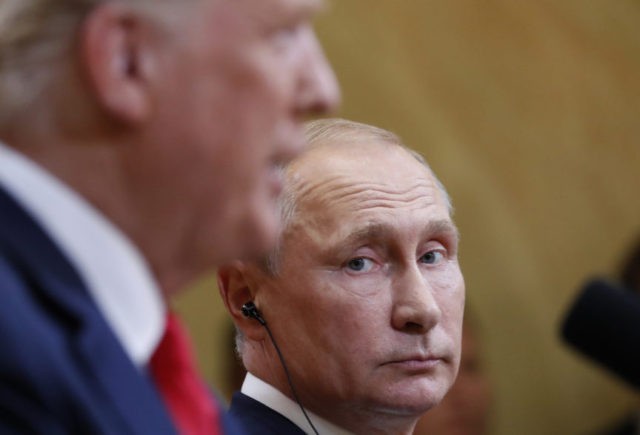In addition to testing advanced weapons such as hypersonic missiles, lasers, and submersible drones, the Russian Defense Ministry announced new nuclear weapons testing this week, even as President Vladimir Putin was meeting with U.S. President Donald Trump in Helsinki.
Russia’s Tass news agency reported on Thursday that testing has been completed on the liquid-fueled nuclear-capable Sarmat intercontinental ballistic missile, intended to be the next-generation nuclear deterrent for “any aggression against Russia and its allies”:
“The program of the system’s pop-up tests has been completed with the positive results, which makes it possible to switch to preparations for the flight trials of the Sarmat missile complex,” the Defense Ministry said.
“All the measures that have been carried out allow for making a clear conclusion that the Sarmat missile system will be created and placed on combat duty within the scheduled timeframe,” the ministry said.
Although these reports speak of “nuclear weapon testing,” there does not appear to be a verified claim of actual nuclear bomb detonations. The Defense Ministry flooded Russian social media with videos of missile launches, submarines, and laser weapons after the Trump-Putin summit, coupled with statements of interest in further arms control negotiations with the United States.
Australia’s News.com viewed it as a theatrical effort to encourage Russians to believe that Putin has delivered on his re-election promise to put super-weapons in the field, and to put some Russian chips on the table for future talks with President Trump:
Back in March, two weeks before his re-election, Vladimir Putin gave a national address showing off the Kremlin’s military might.
In his speech, the Russian leader included a concept video backing up his claims of nuclear weapons and “invincible” missiles that could travel at lightning speed.
“Any use of nuclear weapons against Russia or its allies, any kind of attack, will be regarded as a nuclear attack against Russia, and in response, we will take action instantaneously no matter what the consequences are,” he said. “Nobody should have any doubt about that.”
Washington was sceptical of the announcement, with officials casting doubt on whether Russia had really added any new capabilities to its nuclear arsenal, beyond those already known to the US military and intelligence agencies.
Now, as if to dispel any doubt that he was bluffing, Russia has broadcast a series of Hollywood-style videos showing the testing and operation of these weapons.
Clearly Moscow wants to convey a clear message to the rest of the world: Its nuclear arsenal is no joke, and it’s making fast progress.
Considerable skepticism of Putin’s claims was voiced in March, with the more trenchant critics accusing Putin of hollow bluster on par with North Korea’s Kim Jong-un. Hypersonic missiles are one area where Western defense analysts worry Russia (and China) might be developing a real qualitative advantage. Another area of concern is advanced torpedo technology that could counter the strength of the U.S. Navy and America’s sub-launched nuclear missiles.
The Peresvet laser weapon system showed off by the Kremlin this week is one of its sketchier claims, as the videos provided very little credible information to suggest the weapon actually works. Even if grandiose claims about the Peresvet’s ability to take out satellites prove unfounded, it might still prove to be an effective point defense weapon against drones. Countering drones is a major concern of every hostile military contemplating battle against the United States, and even more so for Russia given the extensive use of American unmanned aerial vehicles in the Middle East.

COMMENTS
Please let us know if you're having issues with commenting.